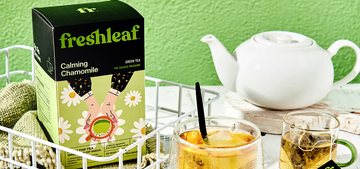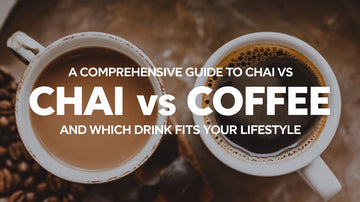A Comprehensive Guide to Chai vs Coffee and Which Drink Fits Your Lifestyle
by Lovlesh Saini on Apr 24, 2025
Let’s be honest, this debate is as old as the first 9 a.m. meeting.
You’re groggy, the day is already rolling, and you reach for a steaming cup of… chai? Or is it coffee today?
For many Indians, chai is tradition, emotion, and comfort. For others, coffee is fuel, focus, and flair. But which one actually fits your lifestyle better?
We’re diving into everything from how each drink affects your body to the kind of personality that thrives on caffeine vs kadak chai. This isn’t just a comparison, it’s a guide to choosing your drink, the one that not only wakes you up but also works with your rhythm.
First, let’s talk about the origins of chai and coffee:
Chai wasn’t born in your average kitchen, it was brewed in royal courts and Ayurvedic texts. Rooted in Indian heritage, “chai” wasn’t originally about tea leaves but a concoction of herbs and spices meant to heal and balance.
Coffee, on the other hand, has a more global backstory. It took a few hundred years and some Ethiopian goats (long story short: they got hyperactive after chewing coffee berries) for the world to realise that caffeine had power.
In India, coffee has always had a more “intellectual” reputation, think of Tamil filter kaapi in brass tumblers or the cafe culture of Bengaluru. Meanwhile, chai became the heartbeat of homes, the railway stations, and conversations across every street corner.
What is Chai, and how is it different than coffee?
The major difference between chai and coffee is the type of drink they are. Chai is a type of spiced tea made with a blend of spices, milk, and black tea, while coffee is a type of beverage made from the roasted seeds of the Coffea plant. Chai has a spiced, aromatic flavor and is often sweetened, while coffee has a strong, bold flavor and may be sweetened with sugar or other sweeteners. In terms of preparation, chai is typically made by simmering the spices, milk, and tea together and then straining the mixture, while coffee is made by brewing ground coffee beans with hot water.
What is chai latte?
A chai latte is a type of hot beverage made with spiced black tea, steamed milk, and a sweetener. The word “chai” means “tea” in many Indian and Middle Eastern languages, and “latte” is a term used to describe a drink made with espresso and steamed milk. A chai latte is similar to a traditional masala chai, a spiced tea beverage popular in India, but it is made with espresso and served in a latte style, with steamed milk and foam on top. Chai lattes are often flavored with spices such as cinnamon, cardamom, ginger, and cloves, and they can be sweetened with honey, sugar, or other sweeteners. Some variations also include a shot of espresso or other flavored syrups.
What each drink says about you
Let’s play a little game. Are you more of a “slow sip on the balcony with a biscuit” person or a “grab a cup, hustle to zoom” kind of soul?
If you’re a chai lover, you probably:
-
Love nostalgia and comfort
-
Thrive on routines and rituals
-
Enjoy social moments and shared breaks
-
Prefer a layered flavor experience, I mean, spice, sweet, and warm
Chai is about experience. It’s made, not just poured. It simmers, boils, and demands your attention for those 7 minutes.
If you’re a coffee drinker, you might:
-
Crave a jolt of energy, fast
-
Enjoy structured mornings
-
Like your beverages strong, focused, and to the point
-
Associate drinks with productivity
Coffee is a solo act. No one’s talking during that first sip. It’s you and your mug and a mental to-do list.
What are the benefits of chai tea?
There are a few potential benefits associated with drinking chai, particularly the traditional masala chai that is made with black tea and spices.
-
Black tea, which is an ingredient in traditional chai, contains antioxidants that may help protect against cell damage and improve overall health.
-
The spices used in chai, such as cinnamon, ginger, and cardamom, may have various health benefits. For example, ginger has been shown to have anti-inflammatory and digestive benefits, and cinnamon has been linked to improved blood sugar control and heart health.
-
Chai may have a calming effect due to the presence of aromatic compounds in the spices used to flavor it. The ritual of preparing and enjoying a warm cup of chai can also be relaxing and help reduce stress.
It’s worth noting that the potential health benefits of chai tea may be less pronounced in chai lattes that are made with espresso and sweeteners, as these ingredients can have negative effects on health when consumed in excess. It’s always a good idea to consume any food or beverage in moderation and as part of a balanced diet.
Is chai tea dehydrating?
Like any other beverage, chai tea can contribute to your daily fluid intake and help you stay hydrated. However, it is important to note that chai tea is not a particularly high source of hydration on its own, as it is made from a combination of water and tea leaves and does not contain a significant amount of electrolytes or other nutrients that are important for hydration.
In general, it is important to stay well hydrated by drinking plenty of water and other fluids throughout the day. This is especially important when it is hot or when you are physically active, as these conditions can increase your body’s need for fluids. If you are concerned about your hydration status, it is always a good idea to listen to your body’s thirst signals and drink when you feel thirsty.
How does chai and coffee make you feel?
Chai is comfort. It soothes, grounds you, and brings people together. It warms your body and slows things down, great for creative work, post-lunch blues, or catching up with a friend.
Coffee, on the other hand, is a focus fuel. It amps you up. Perfect for back to back meetings, exam prep, or whenever life needs a double shot of motivation.
Does chai tea have caffeine?
A cup of chai tea typically contains caffeine because it is made with black tea leaves, which are a natural source of caffeine. The caffeine levels in chai blends can vary depending on the specific type of black tea that is used, the serving size, and the brewing process.
Is chai latte considered to be a coffee?
While a chai latte does contain tea, it is not considered to be a type of coffee. However, the exact amount of caffeine in a cup of tea or coffee can vary greatly depending on the specific type of tea or coffee, the serving size, and the brewing method. For example, a cup of black tea may contain anywhere from 14 to 90 milligrams of caffeine, while a cup of coffee can contain anywhere from 30 to 300 milligrams.
There are also many factors that can affect the caffeine content of tea and coffee, such as the age of the leaves or beans, the altitude at which the plants were grown, whether it’s herbal teas or decaffeinated coffee, and the amount of time the leaves or beans were roasted. In general, however, tea tends to have less caffeine than coffee.
How long should I wait to drink tea after coffee?
There is no specific amount of time that you should wait to drink tea after coffee. It is generally safe to drink tea at any time, whether you have just finished a cup of coffee or not. However, some people may find that the caffeine in coffee can interfere with their ability to sleep, so if you are sensitive to caffeine or are trying to cut back on your intake, you may want to avoid drinking tea too close to bedtime.
How healthy are tea and coffee for you?
Let’s not get too technical, but if you’re watching your caffeine, both drinks can be good or bad; it all depends on how you brew and how much you drink.
Chai has around 15-40 mg of caffeine, helps in aiding digestion, is good for colds, and is antioxidant-rich. Coffee has around 60-140 mg of caffeine, boosts focus, and improves metabolism.
Too much chai with too much sugar = sugar crashes. Too much coffee = jitters and a mini existential crisis at 3 p.m.
How Freshleaf chai teas can be the best choice for you
At Freshleaf, we’re big fans of chai and coffee. But what we’re really obsessed with is making your daily drink feel like a moment of joy, not just a habit.
If you’re a chai person, you’ve got to try our Cutting Masala Chai, packed with bold flavours of ginger, cardamom, and fennel, It’s the kadak sip you deserve after a long day (or even during one).
Or if you lean green and light, our Tulsi Treat Green Tea gives you a calm boost without the caffeine crash.
And for the in-between? Our new Sparkling Tea range is where freshness meets fizz. It’s got the tea extract, the health benefits, and none of the heaviness, perfect for those who want something exciting but not overly caffeinated.
No matter your vibe, there’s a Freshleaf drink that’ll feel just right.
This is not a chai vs coffee but a Chai and Coffee
Some days, you’re chai at 5 pm with mom. Some days, you’re cold brew at 7 am before a pitch.
This guide wasn’t about telling you which one is better, because honestly, they both win. It’s about helping you choose based on your lifestyle.
So go ahead, sip, savour, switch it up. The perfect drink isn’t in a cup, it’s in the moment.


